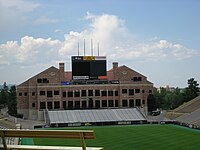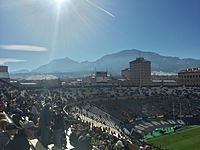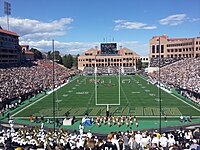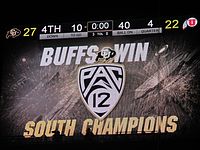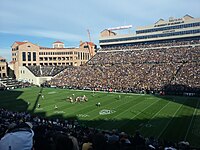Folsom Field
-
- 53,613 (2010–2013)
- 53,750 (2003–2009)
- 50,942 (2001–2002)
- 51,655 (1999–2000)
- 51,808 (1996–1998)
- 51,748 (1991–1995)
- 51,463 (1979–1990)
- 52,005 (1976–1978)
- 50,516 (1967–1975)
- 45,000 (1956–1966)
- 26,000 (1924–1955)
(1924–1970, 1999–present)
AstroTurf (1971–1998)
Sink Combs Dethlefs (renovations)
Folsom Field is an outdoor college football stadium located on the campus of the University of Colorado in Boulder, Colorado. It is the home field of the Colorado Buffaloes of the Big 12 Conference.
Opened in 1924, the horseshoe-shaped stadium has a traditional north–south configuration, opening to the north. The University's athletic administration center, named after 1950s head coach Dal Ward, is located at the north end.
The playing field returned to natural grass in 1999 and sits at an elevation of 5,360 feet (1,635 m), more than a mile above sea level. Folsom Field is the third highest stadium in FBS college football, behind only Wyoming and Air Force of the Mountain West Conference.
History

Gamble Field was the home of Colorado football for two decades, through the first game of the 1924 season. Opened as Colorado Stadium on October 11, Folsom Field has been the continuous home of Buffaloes football. Through the 2021 season, the Buffs have a home record of 323–181–14 (.637).
The stadium was also unofficially called Norlin Stadium, against the wishes of university president George Norlin himself. Colorado Stadium was renamed Folsom Field in 1944, following the death of former head coach Fred Folsom. He led the Silver and Gold for fifteen seasons (1895–99, 1901–02, 1908–15), compiling an overall record of 78–24–2 (.760). The stadium was officially rechristened in the 1946 homecoming game.
In 2008, Folsom Field became the first "zero-waste" stadium in the NCAA by instituting a rigorous recycling and composting program.
Expansions and renovations

When opened in 1924, the horseshoe-shaped stadium had a capacity of 26,000; a major expansion in 1956 raised the height of the stadium, with a new seating capacity of 45,000. The removal of the running track in 1967 added six thousand seats; the track and field team relocated to Potts Field on the East Campus.
A sizable, six-level press box was added in 1968 to the top of the west side grandstand, directly in front of Balch Fieldhouse, the former home of the basketball team. Renovations continued in 1976 when the old, rickety wooden bleachers were replaced with aluminum ones, raising the capacity to 52,005.
In 2003, suites and club seating were added to the east side of the stadium, raising the capacity to 53,750. Since the 2003 renovation, 137 seats with obstructed views have been removed, lowering the seating capacity to 53,613.
In 2014, construction for a further expansion started. This expansion included a new indoor practice facility, a high performance sports center, as well as extra seating on the northeast corner of the stadium.
Before the start of the 2016 season, as part of a $156 million dollar initiative, the north endzone was completely rebuilt. Existing bleachers were renovated into large boxes, club level seating & areas.
The most recent renovation replaced the south endzone's video board, in addition to extending the ribbon board. Completed before the start of the 2024 season, the new video board is over five times the surface area of the previous video board.
Playing surface
From 1924 through 1970, the playing surface at Folsom Field was natural grass. In the summer of 1971, AstroTurf was installed and the first game played on the new surface was a 56–13 win over Wyoming on September 18. Unranked in the preseason, the 1971 Buffs finished third in the AP Poll behind Nebraska and Oklahoma, for a sweep of the top three spots by the Big Eight Conference. The synthetic turf was replaced in 1978 and again in 1989, with "Astroturf-8."
After 28 years of AstroTurf, Folsom Field returned to natural grass in the spring of 1999. The project, which included bio-thermal heating, drainage, and a sub-air system, cost $1.2 million.
Other uses
Concerts
The Grateful Dead played at Folsom on September 3, 1972 and as part of their 15th anniversary June 7 & 8, 1980. The September 1972 show has been partially released on Dick's Picks Volume 36.
The Rolling Stones were at the venue on July 16, 1978 and October 3 & 4, 1981.
The stadium played host to a concert, later released on DVD, by the Dave Matthews Band on July 11, 2001. The band were fined $15,000 for playing 15 minutes over the stadium's curfew time. Afterwards, no concerts were held at Folsom Field for fifteen years.
The stadium hosted Dead & Company for two-night stands during their 2016, 2017, 2018, 2019, and 2022 summer tours. The band holds the record for number of performances at the venue, with 13 shows after the three night stand at Folsom Field for their final Summer Tour in 2023.
| Date | Artist | Opening act(s) | Tour / Concert name | Attendance | Revenue | Notes |
|---|---|---|---|---|---|---|
| September 7, 1969 | Country Joe and the Fish | Steve Miller Band Buddy Guy |
||||
| September 3, 1972 | Grateful Dead | Summer '72 Tour | Rained during show. Officially released on Dick's Picks Volume 36. | |||
| May 10, 1975 | The Doobie Brothers | Henry Gross, Golden Earring, War |
||||
| May 1, 1977 | Colorado Sun Day Festival Fleetwood Mac, Bob Seger, Firefall, John Sebastian |
|||||
| May 13, 1978 | The Beach Boys | Journey | ||||
| July 16, 1978 | The Rolling Stones | US Tour 1978 | 60,000 / 60,000 | $690,000 | ||
| July 21, 1978 | Fleetwood Mac | Rumours Tour | ||||
| July 29, 1978 | Eagles | Steve Miller Band | ||||
| May 13, 1979 | The Doobie Brothers | |||||
| June 7, 1980 | Grateful Dead | Warren Zevon | Summer '80 Tour | |||
| June 8, 1980 | ||||||
| June 28, 1980 | Eagles | |||||
| July 19, 1980 | REO Speedwagon | |||||
| October 3, 1981 | The Rolling Stones | American Tour 1981 | 120,000 | $1,920,000 | ||
| October 4, 1981 | ||||||
| August 21, 1982 | REO Speedwagon | |||||
| October 17, 1982 | The Who | |||||
| August 30, 1983 | Simon & Garfunkel | |||||
| July 12, 1986 | Colorado Sun Day Festival Van Halen, Loverboy, Dio, Bachman-Turner Overdrive |
5150 Tour | ||||
| August 13, 1989 | The Who | |||||
| May 26, 1993 | Paul McCartney | The New World Tour | 37,245 / 39,137 | $1,210,463 | ||
| July 11, 2001 | Dave Matthews Band | Angelique Kidjo Wyclef Jean |
Summer 2001 Tour | 43,041 / 43,041 | $2,130,593 | This show was recorded for the album and DVD entitled, Live at Folsom Field, Boulder, Colorado. |
| July 2, 2016 | Dead & Company | Dead & Company Summer Tour 2016 | 49,166 / 85,582 | $4,179,233 | Dead & Company holds the record for number of performances at the venue, with 13 shows | |
| July 3, 2016 | ||||||
| June 9, 2017 | Dead & Company Summer Tour 2017 | 55,882 / 86,982 | $4,365,860 | |||
| June 10, 2017 | ||||||
| July 13, 2018 | Dead & Company Summer Tour 2018 | 62,904 / 86,982 | $5,369,669 | |||
| July 14, 2018 | ||||||
| July 5, 2019 | Dead & Company Summer Tour 2019 | 67,835 / 86,982 | $6,512,990 | |||
| July 6, 2019 | ||||||
| June 17, 2022 | Dead & Company Summer Tour 2022 | 55,601 / 85,646 | $6,112,360 | |||
| June 18, 2022 | ||||||
| July 1, 2023 | Dead & Company Summer Tour 2023 | 131,450 tickets sold spanning all three shows | $13,371,629 | |||
| July 2, 2023 | ||||||
| July 3, 2023 | ||||||
| August 17, 2024 | Tyler Childers | Mule Pull ’24 Tour | ||||
| June 29, 2024 | Odesza | Bob Moses | The Last Goodbye: Finale | First EDM show at Folsom Field | ||
In popular culture
The south end zone was featured in the opening and closing credits of the late 1970s television show Mork and Mindy, which was set in Boulder.
Other events
Folsom Field is also used as the finish line for the Bolder Boulder, a popular 10K run.
The first Promise Keepers stadium conference was held at Folsom in June 1992.
Attendance records
The largest crowd for a CU football game at Folsom Field was 54,972 in 2005, against in-state rival Colorado State on September 3, in which the Buffaloes won with a 47-yard field goal by Mason Crosby with four seconds remaining. This early-season, non-conference rivalry game, the Rocky Mountain Showdown, is more often played in neutral Denver at Mile High Stadium and its successor Empower Field at Mile High.
The largest crowd ever at Folsom Field was in 1977 for a rock concert, one of the popular Colorado Sun Day concert series. The attendance on May 1 was an estimated 61,500 (exceeding the seating capacity by about 9,000) for a show featuring Fleetwood Mac, Bob Seger, Firefall, and John Sebastian.

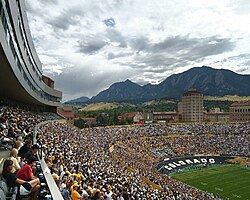
| Rank | Attendance | Date | Game result |
|---|---|---|---|
| 1 | 54,972 | September 3, 2005 | Colorado 31, Colorado State 28 |
| 2 | 54,954 | September 4, 2004 | Colorado 27, Colorado State 24 |
| 3 | 54,841 | November 25, 2005 | Colorado 3, Nebraska 30 |
| 4 | 54,646 | November 16, 2024 | #17 Colorado 49, Utah 24 |
| 5 | 54,215 | October 25, 2003 | Colorado 20, #1 Oklahoma 34 |
| 6 | 54,063 | October 28, 1995 | #7 Colorado 21, #2 Nebraska 44 |
| 7 | 54,032 | September 30, 2023 | Colorado 41, #8 USC 48 |
| 8 | 53,972 | October 12, 2024 | Colorado 28, #18 Kansas State 31 |
| 9 | 53,927 | October 4, 2008 | Colorado 14, #5 Texas 38 |
| 10 | 53,849 | September 23, 1995 | #7 Colorado 29, #3 Texas A&M 21 |
| Season | Coach | Games | Sellouts | W-L-T | Attendance | Average |
|---|---|---|---|---|---|---|
| 1937 | Oakes | 6 | 6–0–0 | 46,826 | 7,804 | |
| 1942 | Yeager | 4 | 4–0–0 | 15,796 | 3,949 | |
| 1946 | Yeager | 5 | 4–0–1 | 53,000 | 10,600 | |
| 1947 | Yeager | 4 | 2–2–0 | 54,000 | 13,500 | |
| 1948 | Ward | 5 | 3–2–0 | 79,479 | 15,896 | |
| 1949 | Ward | 5 | 2–3–0 | 98,776 | 19,755 | |
| 1950 | Ward | 5 | 4–1–0 | 97,748 | 19,550 | |
| 1951 | Ward | 5 | 5–0–0 | 107,121 | 21,424 | |
| 1952 | Ward | 5 | 2 | 3–0–2 | 123,481 | 24,696 |
| 1953 | Ward | 5 | 3–2–0 | 113,640 | 22,728 | |
| 1954 | Ward | 5 | 2 | 3–2–0 | 129,700 | 25,940 |
| 1955 | Ward | 5 | 1 | 4–1–0 | 113,500 | 22,700 |
| 1956 | Ward | 5 | 2 | 3–2–0 | 175,000 | 35,000 |
| 1957 | Ward | 5 | 3–2–0 | 152,500 | 30,500 | |
| 1958 | Ward | 5 | 1 | 2–3–0 | 187,500 | 37,500 |
| 1959 | Grandelius | 6 | 3–3–0 | 177,903 | 29,651 | |
| 1960 | Grandelius | 5 | 1 | 4–1–0 | 185,653 | 37,131 |
| 1961 | Grandelius | 6 | 1 | 5–1–0 | 199,987 | 33,331 |
| 1962 | Davis | 4 | 2–2–0 | 116,000 | 29,000 | |
| 1963 | Crowder | 5 | 1–4–0 | 135,000 | 27,000 | |
| 1964 | Crowder | 5 | 1–4–0 | 140,600 | 28,120 | |
| 1965 | Crowder | 5 | 3–1–1 | 129,700 | 25,940 | |
| 1966 | Crowder | 5 | 1 | 3–2–0 | 196,188 | 39,238 |
| 1967 | Crowder | 5 | 4–1–0 | 196,817 | 39,363 | |
| 1968 | Crowder | 5 | 1 | 3–2–0 | 215,574 | 43,115 |
| 1969 | Crowder | 5 | 5–0–0 | 175,104 | 35,021 | |
| 1970 | Crowder | 5 | 1 | 3–2–0 | 219,521 | 43,904 |
| 1971 | Crowder | 5 | 5–0–0 | 220,171 | 44,034 | |
| 1972 | Crowder | 6 | 3 | 5–1–0 | 307,044 | 51,174 |
| 1973 | Crowder | 5 | 3–2–0 | 246,521 | 49,304 | |
| 1974 | Mallory | 5 | 2 | 3–2–0 | 253,762 | 50,752 |
| 1975 | Mallory | 6 | 6–0–0 | 281,199 | 46,867 | |
| 1976 | Mallory | 6 | 2 | 5–1–0 | 300,191 | 50,032 |
| 1977 | Mallory | 6 | 2 | 5–1–0 | 293,483 | 48,914 |
| 1978 | Mallory | 8 | 2 | 5–3–0 | 383,048 | 47,881 |
| 1979 | Fairbanks | 6 | 1–5–0 | 265,956 | 44,326 | |
| 1980 | Fairbanks | 6 | 1 | 1–5–0 | 245,868 | 40,978 |
| 1981 | Fairbanks | 6 | 3–3–0 | 209,224 | 34,871 | |
| 1982 | McCartney | 7 | 1 | 1–6–0 | 287,023 | 41,003 |
| 1983 | McCartney | 6 | 1 | 3–3–0 | 237,674 | 39,612 |
| 1984 | McCartney | 6 | 1 | 1–5–0 | 235,670 | 39,278 |
| 1985 | McCartney | 6 | 4–2–0 | 220,734 | 36,789 | |
| 1986 | McCartney | 6 | 2 | 3–3–0 | 269,546 | 44,924 |
| 1987 | McCartney | 6 | 1 | 4–2–0 | 268,711 | 44,785 |
| 1988 | McCartney | 6 | 4–2–0 | 235,142 | 39,190 | |
| 1989 | McCartney | 6 | 2 | 6–0–0 | 293,726 | 48,954 |
| 1990 | McCartney | 6 | 4 | 6–0–0 | 310,374 | 51,729 |
| 1991 | McCartney | 6 | 4 | 4–1–1 | 311,458 | 51,910 |
| 1992 | McCartney | 6 | 4 | 5–0–1 | 309,900 | 51,650 |
| 1993 | McCartney | 6 | 5 | 4–2–0 | 311,360 | 51,893 |
| 1994 | McCartney | 6 | 3 | 6–0–0 | 304,897 | 50,816 |
| 1995 | Neuheisel | 6 | 4 | 4–2–0 | 312,958 | 52,160 |
| 1996 | Neuheisel | 6 | 4 | 5–1 | 312,586 | 52,098 |
| 1997 | Neuheisel | 6 | 2 | 3–3 | 309,947 | 51,658 |
| 1998 | Neuheisel | 6 | 5–1 | 284,512 | 47,419 | |
| 1999 | Barnett | 5 | 1 | 4–1 | 239,313 | 47,863 |
| 2000 | Barnett | 5 | 1–4 | 249,950 | 49,990 | |
| 2001 | Barnett | 6 | 1 | 5–1 | 284,848 | 47,475 |
| 2002 | Barnett | 6 | 2 | 5–1 | 295,286 | 49,214 |
| 2003 | Barnett | 6 | 2 | 3–3 | 302,588 | 50,431 |
| 2004 | Barnett | 6 | 1 | 4–2 | 287,368 | 47,895 |
| 2005 | Barnett | 6 | 2 | 5–1 | 302,452 | 50,409 |
| 2006 | Hawkins | 6 | 2–4 | 276,286 | 46,048 | |
| 2007 | Hawkins | 6 | 3–3 | 303,051 | 50,509 | |
| 2008 | Hawkins | 6 | 1 | 4–2 | 296,858 | 49,476 |
| 2009 | Hawkins | 6 | 3–3 | 300,527 | 50,088 | |
| 2010 | Hawkins | 6 | 4–2 | 281,182 | 46,864 | |
| 2011 | Embree | 5 | 1–4 | 251,777 | 50,355 | |
| 2012 | Embree | 6 | 0–6 | 273,235 | 45,539 | |
| 2013 | MacIntyre | 6 | 3–3 | 230,773 | 38,462 | |
| 2014 | MacIntyre | 6 | 1–5 | 226,670 | 37,778 | |
| 2015 | MacIntyre | 6 | 2–4 | 236,331 | 39,389 | |
| 2016 | MacIntyre | 6 | 1 | 6–0 | 279,652 | 46,609 |
| 2017 | MacIntyre | 6 | 3–3 | 282,335 | 47,056 | |
| 2018 | MacIntyre | 6 | 3–3 | 274,852 | 45,809 | |
| 2019 | Tucker | 6 | 2 | 3–3 | 297,435 | 49,573 |
| 2020 | Dorrell | 3 | 2–1 | — | — | |
| 2021 | Dorrell | 6 | 4–2 | 278,906 | 46,484 | |
| 2022 | Dorrell | 6 | 1–5 | 257,084 | 42,847 | |
| 2023 | Sanders | 6 | 6 | 2–4 | 319,081 | 53,180 |
| 2024 | Sanders | 6 | 4 | 5–1 | 315,082 | 52,514 |
Gallery
-
Facade built prior to 2003 season on July 13, 2006
-
Interior view, 2007
-
View to the southwest of the Flatirons in 2016
-
A view of the north side of the stadium in 2016
-
New video boards were added before the 2012 season.
-
Folsom Field's east side as it looked in 2016 after the addition of the Champions Center.
See also
- List of NCAA Division I FBS football stadiums
- List of American football stadiums by capacity
- Lists of stadiums
References
- ^ "Folsom Field Home". University of Colorado Department of Athletics. Archived from the original on October 20, 2010. Retrieved March 6, 2007.
- ^ "Historic Building Inventory Record" (PDF). Colorado Historical Society. Archived from the original (PDF) on August 28, 2016. Retrieved September 19, 2013.
- ^ Colorado.edu - CU campus map
- ^ Color aerial view (& topographic map) of CU campus from USGS via Microsoft Research Maps
- ^ "CUATL Ep. 9: The Man Behind Folsom Field". University of Colorado Boulder Libraries. University of Colorado Boulder. December 2, 2019.
- ^ "Folsom track goes". Reading Eagle. (Pennsylvania). Associated Press. June 24, 1966. p. 26.
- ^ "New track ready for Colorado meet". Lawrence Journal-World. (Kansas). Associated Press. April 28, 1967. p. 15.
- ^ "Folsom Field History". University of Colorado Department of Athletics. Retrieved October 3, 2012.
- ^ "Game 2–California" (PDF). University of Colorado Department of Athletics. September 7, 2010. Archived from the original (PDF) on March 16, 2012. Retrieved October 3, 2012.
- ^ Whitehair, Stuart (January 2, 2012). "Colorado Daily – January". CU at the Game. Retrieved October 3, 2012.
- ^ "Fly through of the upcoming Colorado Buffaloes facilities upgrades". 14 April 2014.
- ^ "CU Boulder Folsom Field South Scoreboard Renovation". www.mortenson.com. Retrieved 2024-11-18.
- ^ "Colorado rolls past Wyoming". Spokesman-Review. (Spokane, Washington). Associated Press. September 19, 1971. p. 9, sports.
- ^ "Grid poll sweep for Big Eight; Huskers, Sooners, Buffs, 1, 2, 3". Spokesman-Review. (Spokane, Washington). Associated Press. January 4, 1972. p. 12.
- ^ College FB Data Warehouse Archived 2012-11-14 at the Wayback Machine 1971 Final AP poll
- ^ CU Buffs.com Folsom Field playing surface
- ^ "Colorado stadium changing to grass". Victoria Advocate. (Texas). Associated Press. December 4, 1998. p. 2B.
- ^ Sounart, Christie (1 June 2016). "Return of the Dead". Coloradan Alumni Magazine. Retrieved 11 July 2023.
- ^ "Paul Epstein's "Let Me Take You Down (to the basement)" #8 | Colorado Music Hall of Fame". March 14, 2023. Retrieved December 8, 2023.
- ^ "The Doobie Brothers Setlist at Folsom Field, Boulder". setlist.fm. Retrieved 2023-11-13.
- ^ "Fleetwood Mac Setlist at Folsom Field, Boulder". setlist.fm. Retrieved 2023-11-13.
- ^ "The Beach Boys Setlist at Folsom Field, Boulder". setlist.fm. Retrieved 2023-11-13.
- ^ "Eagles Setlist at Folsom Field, Boulder". setlist.fm. Retrieved 2023-11-13.
- ^ "The Doobie Brothers Setlist at Colorado Sun-Day 1979 #1". setlist.fm. Retrieved 2023-11-13.
- ^ "Eagles Setlist at Folsom Field, Boulder". setlist.fm. Retrieved 2023-11-13.
- ^ "REO Speedwagon Setlist at Colorado Sun-Day 1980". setlist.fm. Retrieved 2023-11-13.
- ^ "REO Speedwagon Setlist at Folsom Field, Boulder". setlist.fm. Retrieved 2023-11-13.
- ^ "The Who Setlist at Folsom Field, Boulder". setlist.fm. Retrieved 2023-11-13.
- ^ "Simon & Garfunkel Setlist at Folsom Field, Boulder". setlist.fm. Retrieved 2023-11-13.
- ^ "The Who Setlist at Folsom Field, Boulder". setlist.fm. Retrieved 2023-11-13.
- ^ "DMBAlmanac entry for 7.11.01". Retrieved 2009-07-12.
- ^ "Dead & Company's Epic History, by the Numbers". Grateful Web. Retrieved 2023-11-13.
- ^ "Pollstar 2022 Top 300 Concert Grosses" (PDF). Pollstar. December 12, 2022. Archived (PDF) from the original on December 15, 2022. Retrieved December 7, 2023.
- ^ Allen, Bob (2023-07-13). "HOT TICKETS: JULY 13, 2023 - VenuesNow". Retrieved 2023-11-13.
- ^ "Tyler Childers to Bring Global "Mule Pull '24 Tour" to Folsom Field next August". University of Colorado Athletics. 2023-10-04. Retrieved 2023-11-13.
- ^ "Colorado State – Three-Peat over the Rams – CU at the Game".

